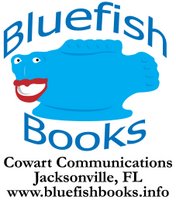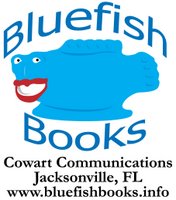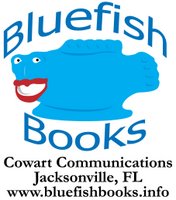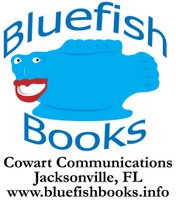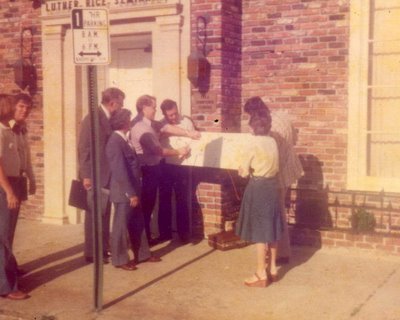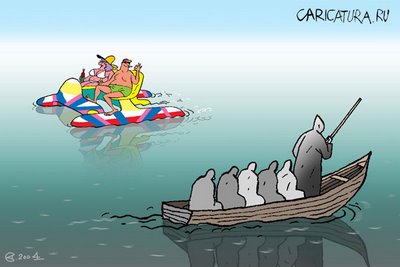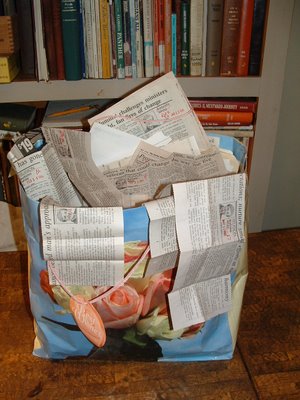
For years and years and years, I have prayed that the Lord would let me publish a significant book.
I wanted to publish a book which would advance His kingdom, win souls, bring joy to the hearts of men, uplift humanity, rescue fair damsels in distress, strengthen the faint-hearted, comfort the feeble-minded, contribute the annals of great literature, outsell Harry Potter and Stephen King combined, make a difference in this weary world, and…
Well, you get the idea.
I think I have found just such a significant book.
Trouble is, it’s not one I wrote.
The book I think will do all this and more is written by someone else — but I am playing a small part in its production.
I’d like to backtrack a bit to tell about my part:
In my work preparing the 16th Century diary of Samuel Ward, a translator of the King James Bible, for publication, I noticed an odd word — ENDITOR.
In those ancient days, that word referred to the last guy to prepare a manuscript for the printer, the guy who made the manuscript consistent, the guy who ended the book — the person we call today an editor.
That’s the role I’ve been playing recently.
Instead of writing my own copy, I’ve been doing routine clerical stuff to prepare a manuscript for a series of books by my friend Barbara White, who’s work has been awarded by numerous journalistic, religious and civic organizations.
For over 15 years at the Florida Times-Union, Barbara wrote a personal account of her spiritual journey. Thousands of readers followed her column, Along The Way.
"I write about trying to live the Christian life and failing and trying again," she said.
She says she’s nothing special, yet the walls of the hall leading into the editorial board room at the newspaper displayed scads of bronze plaques, scrolls, citations and journalistic awards she won for her writing skill.
Although Barbara is a Christian, she told me that one of her biggest thrills came when a Jewish congregation recognized her writing by planting a tree with a commemorative plaque honoring her work in Israel.
Barbara evaluates her own writings as work that she once did — then stuck in a shopping bag in the back of a closet.
When she retired from the newspaper, the publisher gave her all her by-line files from the newspaper archives, and granted her full permission and copyrights to turn her columns into a book. He appreciated the cumulative value of her work.
Yes, Barbara is a neat lady.
Unfortunately, her idea of book preparation is somewhat less than neat.
Here is a photo of the flowered shopping bag full of newspaper clippings she brought for me to turn into a book:
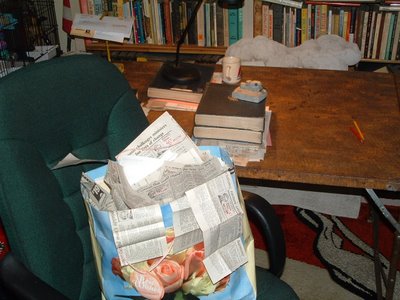
Although Barbara sometimes wears her Phi Beta Kappa Key, proof that she’s a brain, I somehow doubt that she’s ever read the Writer’s Digest guidelines for manuscript submission.
My first task involved simply unfolding all these hundreds of crinkled clippings.
That alone took days.
Next came sorting. I moved a folding table into our foyer to make a bigger work surface:
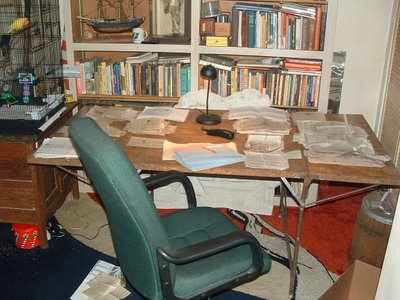
Then each clipping had to be smoothed out and pressed under volumes of my Encyclopedia Britannica. The work overflowed onto the floor and every chair in the house.
For hours Ginny and I discussed the best way to present this material. Our son and his wife, and our daughters helped us collect and arrange and type and sort — it became a family project.
Why go to all this trouble?
Because we feel that Barbara’s work may well be destined to become a spiritual classic.
The humility, power and scope of her life and writing provide a living illustration of what it’s really like to be a Christian.
"I write about trying to live the Christian life and failing and trying again," she said.
I read each article she wrote and culled dated material. I focused on saving pieces which feed my own soul, pieces I feel readers can most identify with, and ones which will most provide help in everyone’s daily struggles, problems, and joys.
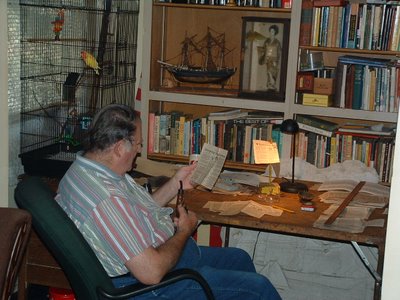
This first reading proved a powerful impact on my own spiritual life.
Yes, preparing this manuscript is a pain in the ass, but it’s worth the trouble.
Then came the hard part — scanning copy.
Barbara’s articles run between two and five columns of newsprint across; my scanner will only pick up a single column at a time. Because of wrinkles, ink bleeds, crinkles, years of being folded, etc., many articles needed to be retyped from scratch.
My daughter Patricia undertook much of that tedious work.
Once an article scanned, it needed to be formatted:
Nothing to it —
All I had to do was: Preview the copy, adjust the marquee, scan in one column at a time, close the scanner program, convert the article into Word, go into Page Set Up command and standardize the margins, save, go back into Page Set Up and change the paper feed size, use the Find/Replace function to remover optional hyphens (these are caused by ink dots and unrecognizable characters, etc — as many as 230 per article); save, remove three to five Section Breaks per article, save, remove bizarre symbols which the scanner thought fun to insert for no apparent reason, save, change the font type and size for Headings and Text Body, Spell Check, save, write a title, insert graphics, save, highlight, copy, transfer to a book format and paste, change indentation, save, re-do the document set up, insert headers and footers, and save. Check the rendering against the hard copy and save. Then red-mark and file the hard copy.
Then move on to the next article.
That’s all there is to it.
Why bother?
Because I feel this may well be the most significant project I’ve ever worked on, the very book I’ve prayed for years to produce.
It’s worth the trouble.
Barbara said, "I write about trying to live the Christian life and failing and trying again" .
To expand my limited work surface I brought in some old wooden onion crates and spread out the scanner operation. I commandeered an asbestoses trivet from Ginny’s kitchen to gently flatten each article against the scanner’s glass screen. 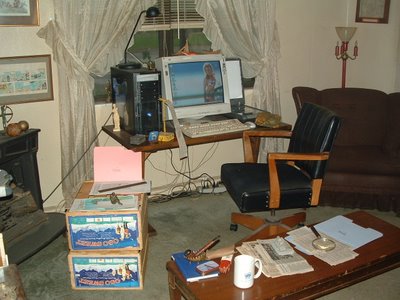
In the midst of all that work, I’ve been inserting graphics and playing with book cover designs.
But, more importantly, as I work on these routine tasks, I am becoming more and more aware of the love of God for me.
As I repeat these rote mundane tasks — Ginny says it’s like Peter and John repairing their fish nets — I’m catching glimpses of the majesty of Christ.
As I shuffle paper, I feel drawn to worship by the magnetic beauty of Jesus.
And I feel thankful.

